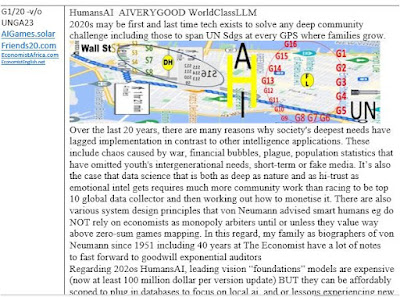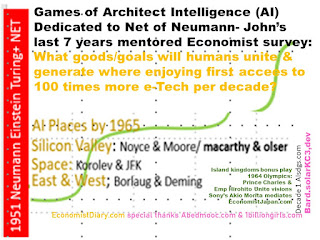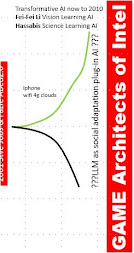1. Description of Activities on AI Project: Athena: Leveraging Artificial Intelligence and Big Data for IFAD 2.0 • Project Description: The ATHENA project seeks to unlock the potential of artificial intelligence and machine learning to accelerate knowledge generation and strengthen data-driven decision-making in IFAD. The project developed an AI toolbox with three main objectives: (1) systemize IFAD’s portfolio to facilitate results measurement and institutional learning, (2) enhance knowledge management through deployment of AI/ML in IFAD ICT systems to make project results and lessons learned accessible and actionable for staff, and (3) predict performance and impact of IFAD projects to inform decisionmaking, optimize targeting, and maximize impact. The (AI) “tool box” contains: o AI-based Intervention Dashboard: a searchable dashboard that classifies IFAD’s investment portfolio by project features, including interventions, outcomes, animal and plant products, among others using natural language processing (NLP); o Lessons Learned Web App: an application to search for relevant “lessons learned” as reported in previous projects to inform new designs reports; o Trend analyses of strategic themes: historical evidence of activities related to strategic topics, such as SDGs, food systems and ICT4D, to understand IFAD’s support and allocation of resources to different activities historically; o Project performance prediction model: a framework for ex-ante prediction of project performance based on a set of project features to facilitate better design and early action throughout project implementation; o Project impact prediction model: a framework to predict the probability of a positive impact of IFAD-supported interventions using impact evaluation data; o Project targeting optimization model: framework and tool to identify beneficiary features to maximize project impact; and o Covid-19 impact prediction model: model to predict impact of the pandemic in IFAD’s beneficiary countries. The tools developed by the project fill a gap within IFAD and the field by aiding and simplifying IFAD reporting, especially for more complex and data hungry thematic areas (i.e. food systems); leveraging under-utilized data resources, namely textual data buried in project reports; and enabling ex-ante data driven design and decision-making by closing the gap between policymakers and project evaluation and by translating data and project insights into actionable metrics. Together, these tools not only enhance IFAD’s knowledge IFAD 22 United Nations Activities on Artificial Intelligence (AI) management but also embed learning and data-driven decision-making into existing project design and implementation processes • Department/Division: Programme Management Department (PMD) • Project Type/Output: Report, Academic paper, Dataset, Seminar/meeting, Software tool • Project Status: Complete • Project Start Year: 2019 • Project End Year: 2021 (Projected) • Project Domain: Agriculture, Poverty • Data Source: o AI-based Intervention Dashboard: Corporate IFAD data on the investment portfolio (financing, sectors, and project type) and textual data from project reports o Lessons Learned App: Textual data from project reports o Trend analyses of strategic themes: Corporate IFAD data on the investment portfolio (financing, sectors, and project type) and textual data from project reports o Project performance prediction model: Corporate data on project performance ratings at design, during implementation, and at completion, corporate financing data and project features, and external open-source data on country-specific risk factors and characteristics from World Bank (WDI), IMF (WEO), and other sources. o Project impact prediction model: Household survey data from IFAD impact assessments o Covid-19 impact prediction model: Google Mobility data, Google Trends data, John Hopkins Coronavirus Resource Center data, and INFORM Covid- 19 risk data, containing data on movement and search prevalence as well as actual reported Covid-19 incidence and risk factors. • Publicly Available Data: No • Technology/Platform: o AI-based Intervention Dashboard: Python, AWS Elasticsearch & Kibana o Lessons Learned App: R Shiny o Trend analyses of strategic themes: Python, R o Project performance prediction model: Stata, R o Project impact prediction model: Stata, Python o Covid-19 impact prediction model: Python, R • Reported as part of 2021 Compendium on UN AI Activities? Yes • Related Sustainable Development Goals (SDGs): All SDGs • Partnership(s)/Collaborator(s): o Academia: several consultants from various academic institutions contributed to the project over the two years of its implementation. Please refer to the acknowledgments sections in the final reports. • Links and Multimedia: o Phase 1 Report: https://www.ifad.org/en/web/knowledge/-/publication/accelerating -knowledge-generation-for-data-driven-decision-making 23 United Nations Activities on Artificial Intelligence (AI) o Phase 2 Report: https://www.ifad.org/en/web/knowledge/-/leveraging-artificial -intelligence-and-big-data-for-ifad-2.0-phase-2?p_l_back_url=%2Fen%2Fweb %2Fknowledge%2Fpublications • Lessons Learned: o Open-Source AI/ML: Open- Source AI/ML and code transparency are essential elements that ensure that dashboards and apps can be updated in a real time fashion, when new data comes in as well as integrated with the organization’s data ecosystem. o Human element to improve algorithmic performance: the human element is essential to improve the accuracy of algorithmic performance and overall quality of the models. In the case of the AI-based intervention dashboard, IFAD staff and domain experts have provided accurate taxonomies and training datasets that have fed the models, producing classifications that are “realistic”. o The complexity of IFAD project documentation is a key challenge for models that require standardized data. Not only are project reports written in four different languages, but they also vary in format and length. Data processing requires the development of multi-lingual algorithms and sensitive data filtration strategies to ensure relevant text is extracted for analysis. o Integration with existing ICT systems and business model: Sustainable and sustained AI/ML and “big data” use cases require appropriate data repositories, server space, and secure data storage within the business model. o Institutional buy-in and support for innovation: Support and buy-in from key actors and a willingness to experiment is crucial to the successful adoption and integration of new data-driven tools for decision-making. o The next steps would include the following activities: users’ validation and scaling-up of the algorithms and tools generated so that they can be integrated in existing IFAD systems (for automated reporting and briefs). Additionally, future phases of the project would also foresee additional work to explore and validate the prediction models by leveraging additional data sources and integrating additional cost data to predict return on investments. • Contact Information: Alessandra Garbero, Phd., Lead Regional Economist, Near East, North Africa, Europe and Central Asia Division (NEN) (a.garbero@ifad.org) 2. Related Sustainable Development Goals SDG 1, 2, 3, 4, 5, 6, 7, 8, 9, 10, 11, 12, 13, 14, 15, 16, 17 3. Relevant Links https://www.ifad.org/en/ Contact Information Alessandra Garbero, Phd., Lead Regional Economist, Near East, North Africa, Europe and Central Asia Division (NEN) (a.garbero@ifad.org) IFAD 24 United N
ED: May The Games of Architect Intelligence (AI) be with you & Mother Earth's 8 billion beings & 1BnG & HAI .. breaking sept 2023 one of my fav 5 hours spent at university!!
 . . | chris.macrae@yahoo.co.uk RIGHT OLD MESS EE: Back in dad's teenage diary as navigator Allied Bomber Command Burma, a day headed ROM meant a friend's flight went missing. In 2023 ROM is politest term we can use for failure to help youth celebrate 73 years of research with von neumann on only good tech can save our species, and 36 years of world class brands architecture research round biggest decison makers started 1988 when dad restored from The Economist: on how bad media can destroy millennials futures. From the last articles we influenced in The Economist Trust has been the exponentially missing metric. Thanks to a chat with Von Neumann's daughter (who's advances for humanity would her dad have trusted most 2025-1950? EconomistDiary.com is launching a game Architect of Intelligence. Dare you play the most urgent cooperation game in sustainability goals hi-tech-trust-touch world? ED dedication : To Architects Fazle Abed & Steve Jobs -who convened silicon valley's 65 birthday to Abed in 2001 giving 7 years of design foresight to why mobile digital network not seen in his 1984 launch of PC networking | INDUSTRIAL REV 260th GAMES-cards of sdg-gen . . . .  Uni2 :FFL*JOBS*DHgoog Guterres*JYK*JFK |  |  | welcome to AIsdgs.com where media designers help take down fake media wherever its wasting 8 billion peoples time you may want to join economist dairy in 1951 when The Economist sub-ed NM was seconded to NYPeinceton for year to listen to John Von Neumann design the number 1 journalism-for-humans quiz, Architecture of Intelligence (AI): it was agreed the most valuable scoop earthlings may e-vision = what goods can humans unite wherever celebrating early access to 100 times more tech per decade? - eg a billion times more 2015=1955 | SDG 5 4 3 2 1 0 welcome to Asia and the top 5 sdgoals 50 years search scaling the most exciting collaborations women-led communities empower | ED soon after 2010 death of Von Neumann's first journalist of Architect Intelligence The Japan Ambassador to bangladesh hosted 2 brainstorming sessions- since 2001 Steve Jobs and Fazle Abed had united their support of net generations futures : would a moon of the top 30 cooperations visioned by 1billiongirls help bridge human intel until Steve Jobs gift of a university in phone (iphone 2007) might renew interest in man made engines blending human intelligence ... EconomistLearning.com from 2009 stanford's fei-fei li began the new entrereneurial revolution of pretraining computer visiosn (in about 10 different ways from science games deepmind, to 1000language games LLM , to object recognition of autonomous cars are ever needed, to nlp to literature veviews in real time of very covid publication to 2019 stanford hai inviting every human discipline grads spend time on to HAI ,,,,as pretraining of humans rose to 2015 hopes were that high that it was time to declare 17 cooperation dev goals and roadmapping of UN2 comprised of dynamic subystems of above zero-sum human networking. Bangladesh as deepest place branding of SDG5 celebrates being 52 years young in 2023 the 265th year of smithian moral sentiments at Abed's Alma mater Glasgow Universiity. Supporting hi-tech hi-trust Asian place winners include: singapore 2023; hong kong (22.1 Place winners 22.22022 ... Thailand2021 ..) . Abed was not just a world class civil engineer; he dedicated half a century until his death in December 2019 as servant leader. Aligned by HG Wells bon mots: civilisation is a race between education and catastrophe, Abed Bhai preferred to be seen as host of microeducationsummit not financiers summits: his gravitation purpose of 30 women empowered cooperations that of united refugees, villagers and civil societies in ENDING POVERTY. | Fortunately for the worlds poorest new nation Bangaldesh 1971- Abed had networks like no other community leader. HIs friends' coop roadmapping reached out to intel vitalised by at least a billion village mothers in tropical inland asia where, a third of infants were dying of diarrhea before Abed's person to person networking became the best news ever chatted. Fro mid 1950s studies in Glasgow he spent nearly 13 years growing to be Royal Dutch Shell Oil Company's regional CEO. So his lifetime searches uniquely capitalised on what UK and Dutch Royal Societies (soon Japan Royals too) knew how to help end the poverty their colonial era had up to 1945 trapped the majority of humans world trade in. Simply put most Asian coastal belts link national borders defined by what these < a href="http://www.kc3.dev">3 kingdoms designed in to trading barriers over nearly half millennium. And which had made the English language that of world class engineering (digital age as well as pre-digital) So by 1970s these nations royal societies (including londons arts green-geographical, medicinie, science, architects ...) were happy that a grounded movement could link them into what they didnt fully know culturally or consciously. From 1970 on Abed linked in global village mapping like no one else - through these relationships and by designing business microfrachises not charity wherever possible for village women to own. To study with abed alumni is to join in the world's most cooperative empowering women movements for good as well as of childrens development. |
No comments:
Post a Comment